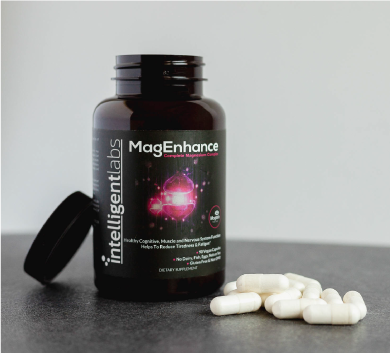Nutrition
Take Magnesium Daily: 10 Life-Changing Benefits For Everyone
Magnesium, an unsung hero in our diet, is vital for maintaining our health. It’s not just a mineral; it’s necessary for more than 300 biochemical reactions in the body, affecting everything from nerve and muscle function to bone strength and heart health.1
Yet, despite its critical role, about 80% of the population might not get enough magnesium.2 This deficiency can lead to various health issues, as you will see below. So, let’s dive into the top 10 benefits of magnesium for both men and women. We’ll explain why ensuring healthy magnesium levels, whether through diet or supplements like our MagEnhance Triple Magnesium Complex, is essential for your well-being.
Table of Contents
But first, why are so many people magnesium deficient?
Over time, the magnesium content in our food has dropped significantly. The push for higher yields in agriculture means fruits and vegetables grow faster, absorbing fewer vitamins and minerals from the soil. As a result, they have lower magnesium levels now compared to 30-40 years ago.3
Also, our shift towards processed foods, which are often low in nutrients, coupled with the stress of modern life, further depletes magnesium from our bodies.

Signs of magnesium deficiency include: 4
- High blood pressure and heart disease
- Other nutrient deficiencies, including vitamin K, vitamin B1, calcium and potassium
- Migraines
- Mental health issues and mood swings
- Trouble sleeping / insomnia
- Restless leg syndrome
- Worsened PMS symptoms
- Osteoporosis
- Recurrent bacterial or fungal infections
- Tooth decay
- Muscle weakness and cramps
- Impotence
What are the top 10 benefits of taking magnesium supplements?
Here are the top 10 benefits of reintroducing proper levels of magnesium into your body, either through improving your diet or by taking a high-quality magnesium supplement like our MagEnhance.
1. Magnesium may support heart health and lower blood pressure
Magnesium is vital for heart health. It’s found in the highest concentration in the heart. The “Atherosclerosis Risk in Communities” (ARIC) study, involving nearly 14,000 middle-aged individuals without heart disease, revealed that lower magnesium levels were linked to a higher risk of coronary heart disease.5
Another study showed that taking magnesium supplements greatly enhanced artery function, endothelial health, and exercise capacity in heart disease patients.6
Multiple studies also indicate magnesium can reduce blood pressure in people with high blood pressure.7 8 9
2. Magnesium may help you relax and fall asleep
Magnesium is a natural relaxant that balances neurotransmitters to prevent the brain from overstimulating. It’s used in conventional medicine to help with life-threatening heart problems such as irregular heart rhythms.
Magnesium is also used in cases of preterm labor, as a muscle relaxant, to slow or stop preterm labor, and to prevent injuries to a preterm baby’s brain.
Nowadays, when muscle tension keeps us awake at night, we use magnesium to help us fall asleep.

3. Magnesium may calm your nerves
Magnesium promotes calmness by binding to GABA receptors in the brain.10 Magnesium can also help lower stress and anxiety.
A lack of magnesium may boost cortisol production, which activates the paraventricular hypothalamic nucleus (PVN) in the brain, a region that regulates stress and anxiety responses.11
4. Magnesium may increase energy and boost sports performance
ATP, our cells’ main energy source, needs magnesium to work. It helps with oxygen use and keeping electrolytes balanced. When you exercise, your magnesium needs can increase by 20%. Not having enough magnesium can kill your gains and raise inflammation.
You also lose more magnesium through sweat and urine when exercising, so ensure you get enough of this mineral!12
Magnesium also helps move glucose into your muscles during exercise and prevents lactic acid from building up.13 Studies show that magnesium boosts performance in athletes, older adults, and those with heart disease.14 15 16
For athletes, taking magnesium supplements has been shown to improve endurance and power.17 18
5. Magnesium helps with migraines
Magnesium helps relax the arteries and blood vessels in the brain, enhancing blood circulation. It also affects GABA receptors in the brain and central nervous system, reducing pain and cortisol levels.
Additionally, magnesium decreases the accumulation of platelets, which is closely linked to migraine development. Various studies have indicated that magnesium may prevent migraines and lessen their intensity.19 20 21
6. Magnesium helps boost learning and memory
Magnesium is important for brain health because it helps our brain cells, or neurons, connect and share information. This process is called ‘brain plasticity,’ which is crucial for learning and thinking.
Magnesium improves brain plasticity by helping neurons make new connections, known as synapses. It does this by regulating calcium flow in the brain, especially at places called NMDA receptors, found between nerve cells. This regulation ensures that nerve signals are sent effectively, making connections more successful. So, having more magnesium in the brain can boost your brainpower, and lead to better learning and thinking abilities.22
7. Magnesium helps relieve muscle aches and spasms

Magnesium is important not only for brain cell connections but also for signal transmission between our spinal cord’s motor neurons and muscles, enabling movement. Without enough magnesium, our muscles can spasm.23
Balancing calcium levels is another key role of magnesium. Our diets often lack magnesium but have plenty of calcium, and taking extra calcium supplements can lead to muscle pains, cramps, and weakness. Adding magnesium to your diet can help with muscle recovery after exercise.
8. Magnesium contributes to bone health
Most people think of calcium when it comes to bones, but magnesium is just as important for bone health. Magnesium is essential for activating certain enzymes that convert vitamin D into its active form, calcitriol. This active vitamin D helps create osteoblasts, the cells that form bone.
Additionally, magnesium helps regulate two hormones that control calcium levels in our bones and teeth. Adequate magnesium suppresses parathyroid hormone and boosts calcitonin, directing calcium to the bones instead of soft tissues, which helps prevent some bone diseases. Research has shown that higher magnesium intake can increase bone mineral density.24
9. Magnesium benefits may include helping with insulin resistance and diabetes
People who consume more magnesium are less likely to develop type 2 diabetes, as magnesium helps manage blood sugar.25 26
Low magnesium levels in the blood, a condition known as hypomagnesemia, can also make insulin resistance worse.27 Additionally, diabetes can cause more magnesium loss through urine, leading to lower magnesium levels in the body. This can further impair insulin function and worsen diabetes symptoms.28
10. Magnesium may help with PMS symptoms
Premenstrual Syndrome (PMS) can be tough, with symptoms like water retention, fatigue, cramps, and irritability. Luckily, magnesium might help ease cramps and reduce water retention. Plus, there’s evidence that magnesium may improve mood swings associated with PMS, making it easier for women to cope with these monthly changes.29 30
Conclusion
To wrap it up, magnesium supports heart health, improves sleep, calms nerves, boosts energy, and offers many other benefits. You may enjoy the full benefits of magnesium with our MagEnhance Triple Magnesium Complex. This supplement includes three types of magnesium (Magnesium Glycinate, L-Threonate, and Taurate), crafted to give your body the magnesium boost it needs.
💬 Something on your mind? Share your thoughts in the comments. We love hearing from curious minds.
📩 And while you’re here, join our newsletter for more smart stuff (and secret perks)!
References:
- Magnesium in man: implications for health and disease. de Baaij JH, Hoenderop JG, Bindels RJ. Physiol Rev. 2015 Jan;95(1):1-46. ↩︎
- Dean, C. (2004).“The miracle of magnesium”. Simon & Schuster. ↩︎
- Donald R. Davis, Declining Fruit and Vegetable Nutrient Composition: What Is the Evidence? HortScience February 2009 vol. 44 no. 1 15-19. ↩︎
- The multifaceted and widespread pathology of magnesium deficiency. Johnson S, Med Hypotheses. 2001 Feb;56(2):163-70. ↩︎
- Is low magnesium concentration a risk factor for coronary heart disease? The Atherosclerosis Risk in Communities (ARIC) Study. Liao F, Folsom AR, Brancati FL. Am Heart J. 1998;136:480–490. ↩︎
- Oral Magnesium Therapy Improves Endothelial Function in Patients With Coronary Artery Disease, Michael Shechter, MD, MA; Michael Sharir, MD; Maura J. Paul Labrador, MPH; James Forrester, MD; Burton Silver, PhD; C. Noel Bairey Merz, MD, Circulation. 2000; 102:2353-2358. ↩︎
- Oral magnesium supplementation reduces ambulatory blood pressure in patients with mild hypertension. Hatzistavri LS, Sarafidis PA, Georgianos PI, Tziolas IM, Aroditis CP, Zebekakis PE, Pikilidou MI, Lasaridis AN. Am J Hypertens. 2009 Oct;22(10):1070-5. ↩︎
- A pilot study on the effects of magnesium supplementation with high and low habitual dietary magnesium intake on resting and recovery from aerobic and resistance exercise and systolic blood pressure. Kass LS, Skinner P, Poeira F, J Sports Sci Med. 2013 Mar 1;12(1):144-50. ↩︎
- Effects of magnesium supplementation in hypertensive patients: assessment by office, home, and ambulatory blood pressures. Kawano Y, Matsuoka H, Takishita S, Omae T. Hypertension. 1998 Aug;32(2):260-5. ↩︎
- Magnesium potentiation of the function of native and recombinant GABA(A) receptors. Neuroreport. Möykkynen T, Uusi-Oukari M, Heikkilä J, Lovinger DM, Lüddens H, Korpi ER.2001 Jul 20;12(10):2175-9. ↩︎
- Magnesium deficiency induces anxiety and HPA axis dysregulation: Modulation by therapeutic drug treatment. S.B. Sartori, N. Whittle, A. Hetzenauer, and N. Singewald. Neuropharmacology. 2012 Jan; 62(1): 304–312. ↩︎
- Update on the relationship between magnesium and exercise. Nielsen FH, Lukaski HC. Magnes Res. 2006 Sep;19(3):180-9. ↩︎
- Magnesium enhances exercise performance via increasing glucose availability in the blood, muscle, and brain during exercise. Chen HY, Cheng FC, Pan HC, Hsu JC, Wang MF.PLoS One. 2014 Jan 20;9 ↩︎
- Oral magnesium therapy, exercise heart rate, exercise tolerance, and myocardial function in coronary artery disease patients. Pokan R, Hofmann P, von Duvillard SP, Smekal G, Wonisch M, Lettner K, Schmid P, Shechter M, Silver B, Bachl N. Br J Sports Med. 2006 Sep;40(9):773-8. ↩︎
- Effect of oral magnesium supplementation on physical performance in healthy elderly women involved in a weekly exercise program: a randomized controlled trial. Veronese N, Berton L, Carraro S, Bolzetta F, De Rui M, Perissinotto E, Toffanello ED, Bano G, Pizzato S, Miotto F, Coin A, Manzato E, Sergi G. Am J Clin Nutr. 2014 Sep;100(3):974-81. ↩︎
- The effect of acute magnesium loading on the maximal exercise performance of stable chronic obstructive pulmonary disease patients. Amaral AF, Gallo L Jr, Vannucchi H, Crescêncio JC, Vianna EO, Martinez JA. Clinics (Sao Paulo). 2012;67(6):615-22. ↩︎
- On the significance of magnesium in extreme physical stress. Golf SW, Bender S, Grüttner J. Cardiovasc Drugs Ther. 1998 Sep;12 Suppl 2:197-202. ↩︎
- Magnesium status and the physical performance of volleyball players: effects of magnesium supplementation. Setaro L1, Santos-Silva PR, Nakano EY, Sales CH, Nunes N, Greve JM, Colli C. J Sports Sci. 2014;32(5):438-45. ↩︎
- Oral magnesium oxide prophylaxis of frequent migrainous headache in children: a randomized, double-blind, placebo-controlled trial. Wang F1, Van Den Eeden SK, Ackerson LM, Salk SE, Reince RH, Elin RJ. Headache. 2003 Jun;43(6):601-10. ↩︎
- Comparison of therapeutic effects of magnesium sulfate vs. dexamethasone/metoclopramide on alleviating acute migraine headache. Shahrami A, Assarzadegan F, Hatamabadi HR, Asgarzadeh M, Sarehbandi B, Asgarzadeh S. J Emerg Med. 2015 Jan;48(1):69-76. ↩︎
- The effects of magnesium prophylaxis in migraine without aura. Köseoglu E1, Talaslioglu A, Gönül AS, Kula M. Magnes Res. 2008 Jun;21(2):101-8. ↩︎
- The mechanism of magnesium block of NMDA receptors, J.Peter Ruppersberg, Eberhard v. Kitzing, Ralf Schoepfer, Seminars in Neuroscience, Volume 6, Issue 2, April 1994, Pages 87-96 ↩︎
- Muscle cramps and magnesium deficiency: case reports. D. L. Bilbey and V. M. Prabhakaran, Canadian Fam Physician. 1996 Jul; 42: 1348–1351. ↩︎
- Institute of Medicine (IOM). Food and Nutrition Board. Dietary Reference Intakes: Calcium, Phosphorus, Magnesium, Vitamin D and Fluorideexternal link disclaimer. Washington, DC: National Academy Press, 1997. ↩︎
- Rodriguez-Moran M, Simental Mendia LE, Zambrano Galvan G, Guerrero-Romero F. The role of magnesium in type 2 diabetes: a brief based-clinical review. Magnes Res 2011;24:156-62. ↩︎
- Larsson SC, Wolk A. Magnesium intake and risk of type 2 diabetes: a meta-analysis. J Intern Med 2007;262:208-14. ↩︎
- Simmons D, Joshi S, Shaw J. Hypomagnesaemia is associated with diabetes: not pre-diabetes, obesity or the metabolic syndrome. Diabetes Res Clin Pract 2010;87:261-6. ↩︎
- Rude RK. Magnesium. In: Ross AC, Caballero B, Cousins RJ, Tucker KL, Ziegler TR, eds. Modern Nutrition in Health and Disease. 11th ed. Baltimore, Mass: Lippincott Williams & Wilkins; 2012:159-75. ↩︎
- Facchinetti F, Borella P, Sances G, Fioroni L, Nappi RE, Genazzani AR. Oral magnesium successfully relieves premenstrual mood changes. Obstet Gynecol. 1991 Aug;78(2):177-81. ↩︎
- Walker AF, De Souza MC, Vickers MF, Abeyasekera S, Collins ML, Trinca LA. Magnesium supplementation alleviates premenstrual symptoms of fluid retention. J Womens Health. 1998 Nov;7(9):1157-65. ↩︎





